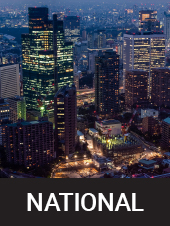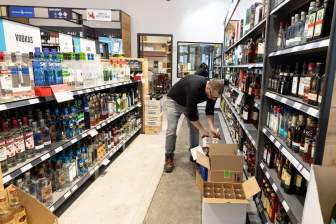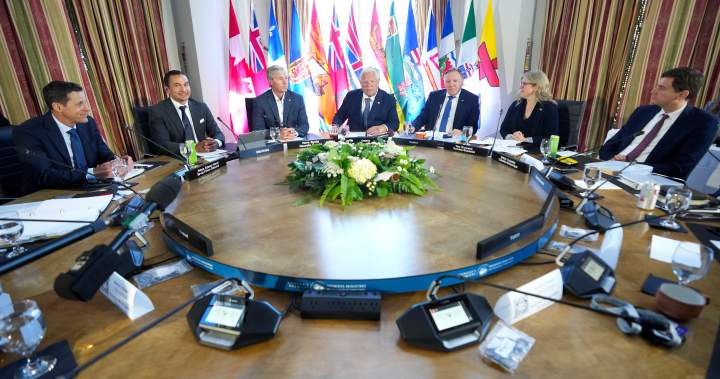Canada’s premiers are hoping for significant changes to the rules which govern how provinces and territories’ health-care systems are funded on the final day of talks in Ontario’s cottage country.

A Wednesday morning meeting to end a three-day summit at Deerhurst Resort in Huntsville, Ont., will focus on internal trade, bail reform and changes to how health-care is paid for.
The current set-up involves all provinces paying into a central pot through the tax system. The money is then divided across the country using a per-capita formula, which ensures funds are available for people in every province to receive broadly the same care.
That per capita formula, however, is raising concerns from some premiers.
New Brunswick Premier Susan Holt said her province had an aging, less healthy population than other parts of the country and payments based only on the number of people failed to capture the cost of complex care.
Story continues below advertisement
“We certainly think they should respond to the population’s needs,” she told reporters on Wednesday morning. “I think that we should meet Canadians’ needs for health care and we know it costs more to service somebody who has a chronic health issue and someone who is later in life and so we think the transfer should recognize that older and sicker Canadians need more investment.”
Premier Doug Ford, however, who leads the country’s most populous province, complained tax revenue in Ontario is being sent to other provinces.
More on Politics
More videos
“We are short-changed as far as I’m concerned,” Ford said, talking about transfer payments from the federal government, including health care. “I just want to speak to the people of Ontario. On equalization and transfer payments, at the end of the day goes into one big pot.”

Get daily National news
Get the day’s top news, political, economic, and current affairs headlines, delivered to your inbox once a day.
Asked if he disagreed with Holt’s push for a needs-based formula, the Ontario premier said he understood the need for smaller provinces to receive extra support.
“I’ve always said, I’ve no problem taking care of the smaller provinces and territories, but in saying that we need our fair share of health care,” he said.
According to the federal government website, Ontario will receive an average payment of $1,728 per person from the federal government across health care, social services and equalization payments. New Brunswick, with its substantially smaller population, will get $5,256 per person.
Story continues below advertisement
The total health transfer for Ontario will be more than $21 billion compared to just over $1 billion for New Brunswick.
The premiers are also discussing bail reform and internal trade.
On trade with the United States, the premiers have a spectrum of views. Some, like Ford and British Columbia Premier David Eby, have argued for retaliation if President Donald Trump slaps on 35 per cent tariffs, while another group, including Saskatchewan’s Scott Moe, are less convinced.
Where there does appear to be consensus is on bail reform. Holt, who is a Liberal and Ford, a Progressive Conservative, both called on the federal government to tighten Canada’s Criminal Code and make it harder for people accused of crime to receive bail. British Columbia’s Premier David Eby, a New Democrat, and Saskatchewan’s Moe made similar comments.
Trending Now

Marjorie Taylor Greene warns Trump may lose MAGA base over Epstein files

U.S. liquor sales have dried up in Canada amid trade war, industry says
Since Monday, Ontario Premier Doug Ford has hosted provincial and territorial premiers in Muskoka for discussions dominated by trade talks, including a briefing from the prime minister.
Story continues below advertisement
The first day featured a meeting which ran for roughly three hours of talks with Indigenous leaders, before Ford hosted premiers and the prime minister at his family cottage for dinner.
Tuesday was dominated by the threat of tariffs from U.S. President Donald Trump. Prime Minister Mark Carney chaired a briefing with premiers on the odds that a deal with the States can be reached.
Thirty-five per cent tariffs are currently scheduled for Aug. 1.
While the premiers and prime minister appeared to broadly agree about the threat from the United States, the need to improve internal trade and concerns about Trump’s unpredictability, they emerged with few concrete solutions.
A news release issued directly after the meeting wrapped earlier than expected pointed to the need to work quickly on major projects and to coordinate federal tariff responses.
It did not include any specific retaliation that the council had agreed upon, nor did it identify nation-building projects they would all back.
The second day ended with an evening reception for the premiers, Ontario Progressive Conservative caucus members and other major stakeholders.
Wednesday morning’s meeting is set to be the last of the three-day summit, with a bevy of final topics. The premiers will discuss internal trade, which has been a discussion that dominated the three days in the context of U.S. trade.
Story continues below advertisement
Advocating for bail reform is also on the agenda, along with health-care changes such as speeding up drug approvals.
© 2025 Global News, a division of Corus Entertainment Inc.

